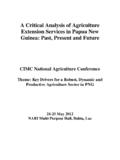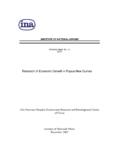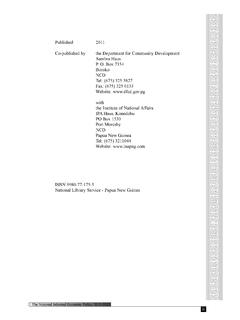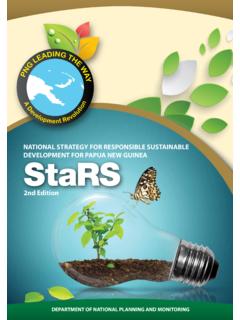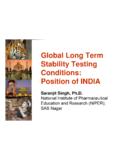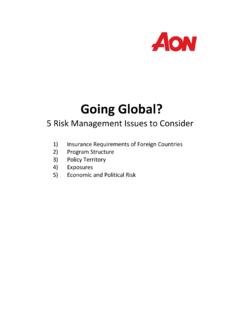Transcription of Foreword - Institute of National Affairs
1 PNG National Water, Sanitation and Hygiene (WaSH) Policy 2015-2030 Foreword Department of National Planning and Monitoring i Foreword The papua New Guinea Water, Sanitation and Hygiene (WaSH) Policy 2015 embodies the commitment of the Government of the Independent State of papua New Guinea to sustainably improve the quality of lives of people both in the rural and urban areas of the country. papua New Guinea has a clear development agenda based on the Vision 2050 objective of being in the top 50 in terms of the UN Human Development Index by 2050.
2 This objective is to be couched within a development paradigm as directed by The Constitution and the National Strategy for Responsible Sustainable Development (RSD). Our development objectives must be founded on principles of responsible development which is self-perpetuating and does not compromise environment capital and put our children s future at risks. Such a sustainable development approach to development is based on our strategic strengthens and assets which can actually contribute solutions to global food and water security, sustainable energy and mitigate the effects of climate change.
3 The Strategy (RSD) identifies our country s abundant water asset as strategic in the sense of the potential solutions it provides for export, particularly into Northern Australia for irrigation purposes, but also hydroelectricity. These solutions in terms of cheaper, clean energy within country are also evident. I want to thank the World Bank for their assistance in the development of this Policy and mention our desire to utilize WaSH funding from the EU to leverage funding from the World Bank to support the implementation of our Government s Policy in conjunction with the District Development Authorities to fill the gap below provincial and regional town level.
4 I acknowledge also our other Development Partners, including civil society partners in this sector and express our Government s desire to continue to work with them in a similar fashion. This policy focuses on improved service delivery of drinking water, sanitation and promoting long term hygiene behaviour change (collectively known as WaSH). Improved access is essential for human development and therefore the sustainable development of our country. To date, PNG has never had a WaSH Policy and approaches to achieving National targets have been haphazard and uncoordinated.
5 As a result, access to improved water sources and safe sanitation has been declining in recent years as services fail to keep up with population growth and demand. This has resulted in the increased incidence of diseases and hardship felt most acutely by the more vulnerable in our society. The papua New Guinea WaSH Policy aims to reverse that trend and improve water, sanitation and hygiene service delivery for the benefit of the people of papua New Guinea, and in doing so improve personal health, productivity and well-being. Access to these services is a vital component of sustainable development and the alleviation of poverty.
6 This Policy identifies 7 particular strategies, including a revised institutional framework and improved monitoring. This provides for a focused, clear and strategic approach to improving access to water and sanitation, establishing an improved service delivery and performance monitoring framework that links the ambitions of existing Government Development Policies to actual improved services on the ground. It also supports proposed changes in existing government policies such as the Water and Sewerage Act 2015.
7 PNG National Water, Sanitation and Hygiene (WaSH) Policy 2015-2030 Foreword Department of National Planning and Monitoring ii Implementation of this Policy will ensure a more prioritised, structured approach to planning, linked to more accurate and transparent budgeting, implementation and monitoring, building on the strengths and capabilities of decentralised planning and drawing improved funding into the sector. The policy is to be used by all WaSH stakeholders who are involved in regulating, managing, planning, financing, implementing, facilitating or monitoring water supply, sanitation and hygiene improvement programs and activities.
8 Through this collaborative approach, we will be working together to achieve the government s Development Strategic Plan target of 70% accessibility to water supply and sanitation by 2030. The successful implementation of this policy will contribute towards improving the lives of the majority of PNG s citizens, enhancing their productivity and participation in the sustainable development of our country through better water, sanitation and hygiene services in papua New Guinea. _____ Hon. Charles Abel, MP Minister for National Planning & Monitoring PNG National Water, Sanitation and Hygiene (WaSH) Policy 2015-2030 PREAMBLE Department of National Planning and Monitoring iii Preamble Having equitable access to safe, convenient and sustainable water supply and sanitation and improved hygiene practices with long term hygiene behaviour change by individuals and majority of papua New Guineans living in rural areas and urban settlements, is crucial.
9 This policy is an important tool which is aimed at translating our development pathway envisaged in the Vision 2050, DSP 2010-2030, the MTDP 2011-2015 and the bridging MTDP 2015-2020 in reaching our global tailored commitments to the Millennium Development Goals, and the Sustainable Development Goals. This policy aims to see a significant, sustainable and equitable increase in access to safe water and sanitation and improved hygiene practises, particularly in the poorly served rural and peri-urban areas.
10 Improvements in Water, Sanitation and Hygiene will have considerable impact in elevating the health the lifestyles of individuals and communities to a higher quality of life; improve school attendance for children and save time to collect water. The expected outcome of this policy will usher and contribute significantly to: 1. Reduce morbidity and mortality caused by water-related diseases; 2. Improve livelihood opportunities and economic growth through improved health and reduce economic and financial losses; and 3. Increase equity of services between rural, peri-urban and urban areas, and to disadvantaged groups.
